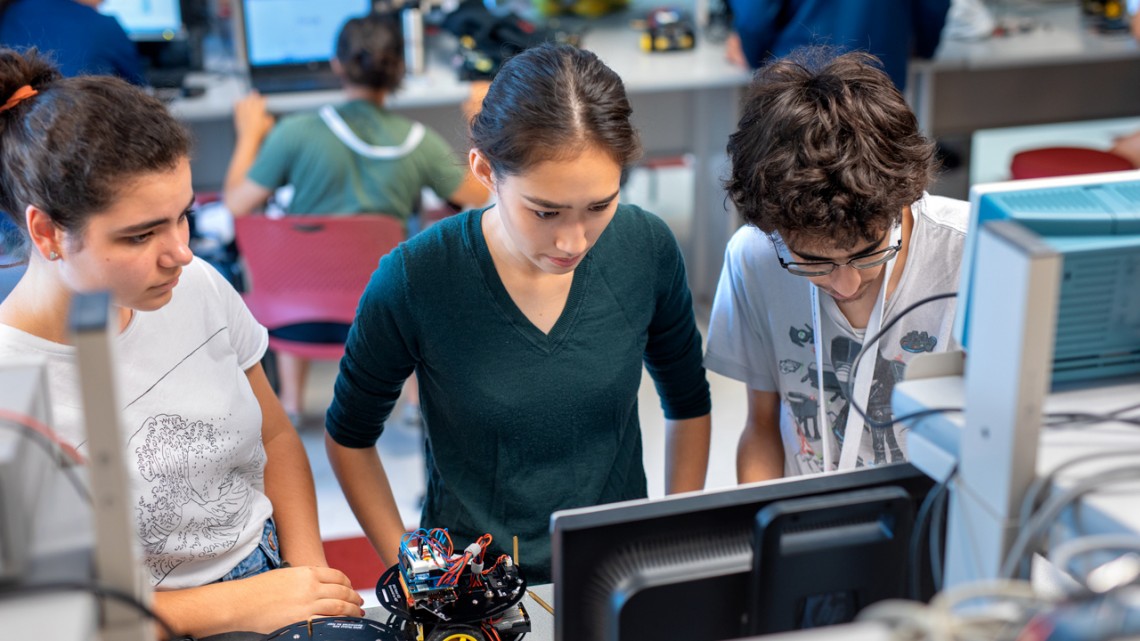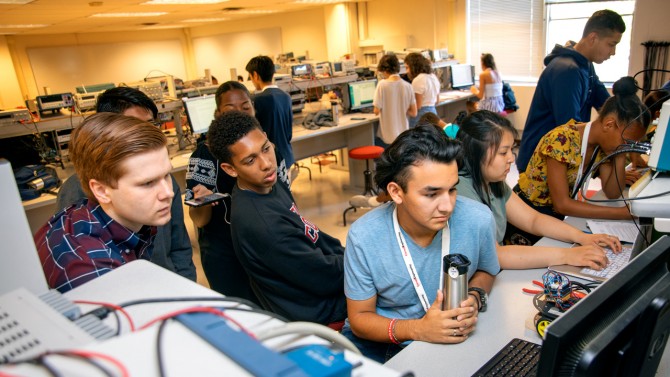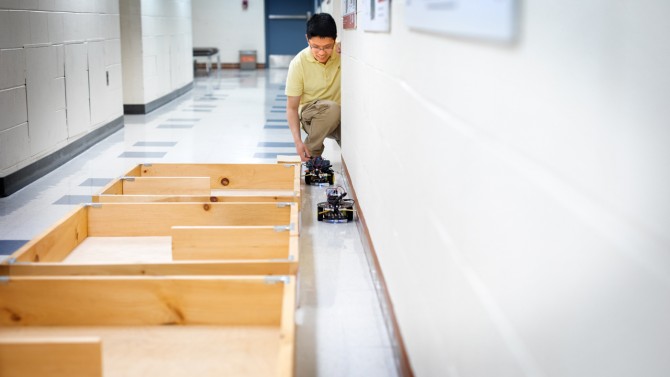
Teaching assistant Megan Backus '21, center, helps two CATALYST Academy participants with coding.
High schoolers learn to create intelligent robots
By Melanie Lefkowitz
Diani Jones, a rising high school senior from Jersey City, New Jersey, had little experience with coding before she arrived at Cornell for an engineering workshop.
By week’s end, she’d worked in two programming languages, built a rudimentary computing device and, with her team, programmed a robot to zoom along at a speed it interpreted from a handwritten number.
“If you’d told me at the beginning of the week that I’d be able to code a robot to do things, I’d have been very surprised,” said Jones, one of 44 high school students who participated July 15-21 in the CATALYST Academy, a program aimed at inspiring minority students to study engineering. “To actually be able to apply my knowledge of coding to replicate smart-vehicle technology on a smaller scale is really cool.”
Zhiru Zhang, associate professor of electrical and computer engineering, led the weeklong, hands-on lab workshop, which introduced the students to digital intelligence – the creation of “smart” objects that perceive, process and learn from information so they can perform tasks intelligently and independently.
Zhang said the students learned not only the basic hardware and software skills underlying digital intelligence, but developed an appreciation for the ways this technology is poised to transform their daily lives – from enabling self-driving vehicles to predicting human diseases.
“They’re just scratching the surface, but I hope they see what this field is about,” he said. “Digital intelligence is pretty much going to change every aspect of the world. We could definitely use more talent in the future, especially from minority students, and hopefully these students will be inspired to come join us in the field.”
Students spent three days focusing on computer hardware, programming and machine learning before applying their new skills to create their own intelligent devices. On the workshop’s final day, the teams presented their internet-connected intelligent robots. They used handwritten-digit recognition systems to wirelessly control the robots’ speed, and various sensors to implement simple self-driving behaviors such as rapid target finding and adaptive cruise control.
The students reused robots created in 2014 by Christopher Batten, associate professor of electrical and computer engineering, for the CURIE Academy, a summer engineering program for high school girls.
Jacob Rodriguez, a rising junior from Orange County, California, said he’s been accepted by summer engineering programs in the past, but had not been able to attend because of the cost. For CATALYST, he received full tuition assistance and a travel stipend, he said.
“It’s awesome, because this was the first summer program I was able to go to,” said Rodriguez, a member of his high school’s robotics club. He said he especially appreciated hearing from College of Engineering admissions officers, who gave him an overview of the college application process.
Fernando Moreno, a rising junior from Puerto Rico, said he was struck by Cornell’s diversity and the friendliness of the instructors and the staff.
“Learning how to program has been really fun and really cool,” Moreno said. “Now I feel like I know enough to hold my ground in programming. I feel really confident.”
CATALYST is sponsored by Shell, which provides tuition funding for at least two participants, and alumni donors Han-Yang Lo ’98, Elaine Tam ’98, and Harvey Willensky ’71 and Marge Willensky.
Media Contact
Get Cornell news delivered right to your inbox.
Subscribe


